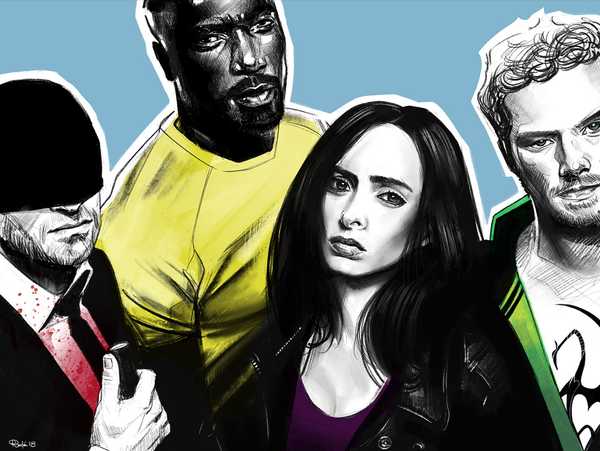The new trilogy has been controversial—for reasons I find both petty and meaningless. *sips tea* But that's none of my business.
Among the most controversial aspects is Kylo Ren. Some of the "Star Wars" fandom feels for him and some want him to remain the villain. I think it's pretty clear which camp I fall into.
To me, Kylo Ren's story would be an answer to the cry of every heart who has ever known guilt: you are never too far gone. Kylo Ren has committed unspeakable and horrific acts, mercilessly killing an unknown number of people (though one can guess the number is rather high). But his redemption and return to Ben Solo would be a testament and encouragement to people who have messed up and feel like they can never be forgiven.
Not only would it be an important message for the world in general, but it seems inevitable for a few reasons.
1. Flashbacks to his childhood.

While not in the movies, the "Star Wars" novels have given peeks into Ben Solo's childhood. "The Last Jedi" novelization provided a look at young Ben Solo through the eyes of his mother, Leia. She recalls how he tumbled in her womb, how soft he was as a baby, and how he always followed Han as a toddler, "carrying the dice from the Millennium Falcon...and promising anyone who'd listen that one day he'd be a pilot, too, just like his daddy."
It makes sense, then, that Ben has a moment clutching the dice as they disappear at the end of the film, most likely recalling the same memory. His pained expression and despondent body language leads one to believe that it causes him emotional turmoil, most likely because he regrets his actions.
Unlike Palpatine, who was shown as evil and cunning from the time he was a child, Ben Solo is shown as knowing love and compassion. He's not like other "Star Wars" villains—except for maybe Anakin.
2. Killing his dad tore him apart.

In "The Force Awakens," Kylo Ren was starting to struggle with the call to the light, and in an effort to further cement himself in the Dark Side, he killed Han Solo. By "The Last Jedi," however, we learn that this only magnified his internal struggle. The average villain doesn't grapple with his own conscience as much.
3. He couldn't bring himself to shoot down his mother.

While he was able to find it within himself to kill his father, Kylo Ren couldn't actually fire the gun, though it was ready and trained on the target. He hesitates, decides against it, and someone else does it instead. There's enough light in him to refrain from committing even more heinous acts.
4. He destroyed his mask and went without it for most of "The Last Jedi."
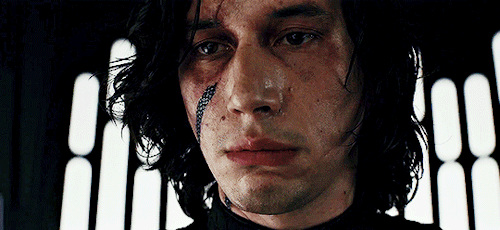
The moment in "The Force Awakens" when he removes the helmet to reveal floppy hair and a young face should have been enough of a clue that he wasn't a typical villain; the audience was supposed to be ever so slightly endeared, to feel for him. As if that wasn't enough, Episode VIII shows Kylo Ren in a fit of rage, recently reminded of his internal struggle, smashing his helmet against the elevator wall and leaving it behind him in pieces. For the remainder of the film, he's seen without it. Talk about symbolism. Kylo Ren is destroyed; long live Ben Solo.
5. He was near tears when Rey confessed how alone she felt.
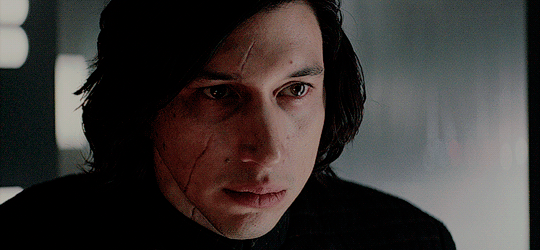
As Rey opens up about not finding the identity of her parents, confessing how alone she feels, Kylo Ren looks ready to cry, deeply affected by her emotions. Not only is he empathetic, but he assures her that she's not alone. When has a villain ever? The writers wouldn't be allowing him to be not only so sorrowful but affected by others' sorrow unless it was to make the audience care for him.
6. He killed Snoke to save Rey.
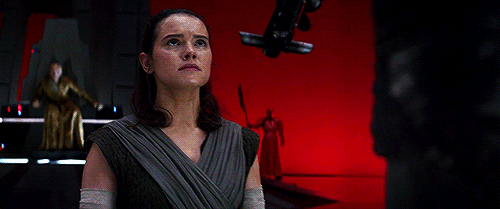
Many have told me that his reason for killing Snoke was selfish and purely strategic, doing so only so he could take his place as Supreme Leader. This line of thinking doesn't hold up for multiple reasons.
For one, Kylo Ren didn't even want the position, initially. After he and Rey destroyed the praetorian guards, he begged her to join him as they, together, left behind both the Jedi and the Sith. If he had merely wanted power, he wouldn't have suggested creating a new order of things or letting the past die. It's only when Rey rejects, attempts to fight, and leaves him that he decides to take up the role of Supreme Leader.
Furthermore, he seemed mostly affected when Rey was in danger. While killing Snoke for himself wouldn't have been a terrible thing—I could even excuse it as something bordering good and healthy—given the abuse he endured for years, he was only set against Snoke after forming a bond with Rey and seeing her tortured. He wanted to rescue her, kill his abuser, and start a new order with Rey. None of these are villain-esque motivations and instead point to his eventual redemption. No other villain, besides Anakin, has acted for others—and we all know how that ended (hint: with his redemption).
7. He's free from the toxic male influences in his life and to choose for himself.
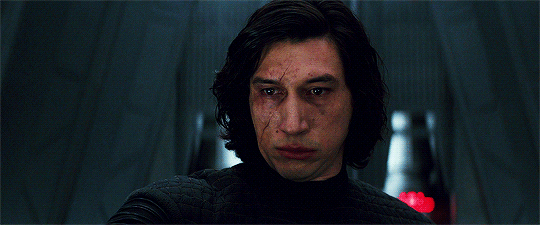
Ben Solo's life was marked by three particular men who all, in their own ways, pushed him further to the Dark Side. Han Solo was an absent father, as his reunion with Leia in "The Force Awakens" seemed to suggest.
Luke Skywalker was meant to be his mentor, and instead he tried to kill him. However brief or instinct-driven that attempt on Ben's life was, Luke was still more naturally inclined to kill Ben than to try to save him. He betrayed his nephew.
Snoke's toxic and abusive influence is the most obvious and evil of the three. Snoke has been manipulating him to join the Dark side for years, and once he has, there's emotional and physical abuse that follows.
Now all of them are gone, and Ben is responsible for all of them. While Snoke's death is the only justifiable murder, Ben is at least now free to choose his own destiny, no longer influenced by any of them, however good-intentioned they may have been. Their influences in Ben's life doesn't by any means negate his own responsibility for his actions, but if Han had been more involved or Luke had tried to help instead of kill, maybe resisting Snoke would've been easier.
Regardless, it's up to Ben now to choose what he wants to do: continue as Supreme Leader or find redemption. Without any of those men in his life and with Rey no longer fighting for him, there's hope that he will choose the latter—for himself.
8. His redemption would tie in with the series' message.

You can't say that the "Star Wars" franchise isn't built on redemption. Episodes IV through VI were about Luke's hero journey and Darth Vader's turn to the Light Side. Anakin's story was so important that three additional movies were created to delve more deeply into this redemption, laying the foundation for it.
Now we have Anakin's grandson at the front and center of the new trilogy. Ben's admiration of his grandfather is symbolic and telling in its own way: while it may be the Kylo Ren in him who looks up to Darth Vader, it seems more likely that it's the writers telling the audience, he will finish what Darth Vader started; he will follow in his footsteps on the path of redemption.
I'm by no means an expert, but after studying creative writing for four years at a collegiate level, I'm convinced that Kylo Ren's redemption is foreshadowed throughout the series and every one of the aforementioned reasons is a deliberate decisions to showcase such an inevitability. It'd be bad writing if that wasn't the purpose, and I trust Rian Johnson and J.J. Abrams too much to believe such a thing.
Even Ben's name, named after Obi-Wan Kenobi, the last hope, is a foreshadowing of his redemption, and I, personally, can't wait to see it in Episode IX.













